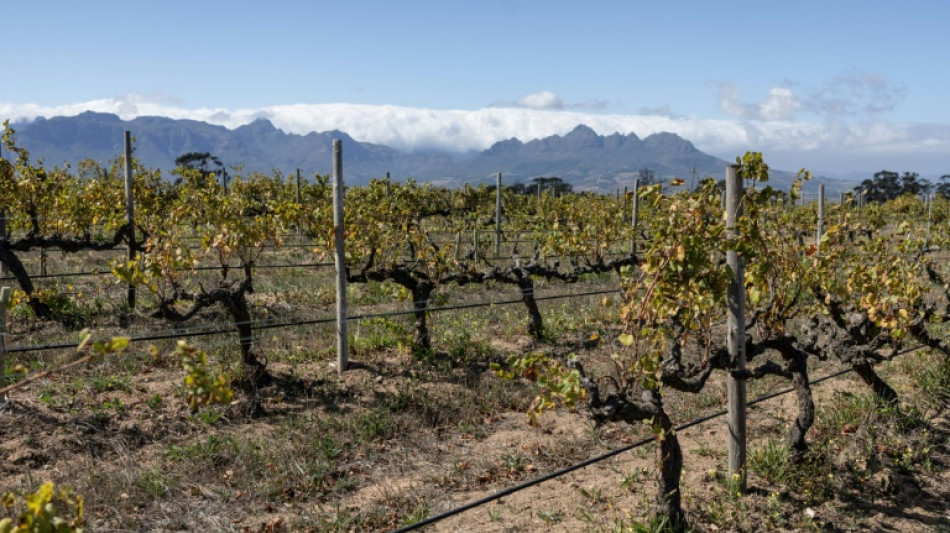
-
 EU warns Meta it must open up WhatsApp to rival AI chatbots
EU warns Meta it must open up WhatsApp to rival AI chatbots
-
Scotland spoil Italy's T20 World Cup debut with big win

-
 Israeli president says 'we will overcome evil' at Bondi Beach
Israeli president says 'we will overcome evil' at Bondi Beach
-
Munsey leads Scotland to 207-4 against Italy at T20 World Cup

-
 Japan restarts world's biggest nuclear plant again
Japan restarts world's biggest nuclear plant again
-
Bangladesh poll rivals rally on final day of campaign

-
 Third impeachment case filed against Philippine VP Duterte
Third impeachment case filed against Philippine VP Duterte
-
Wallaby winger Nawaqanitawase heads to Japan

-
 Thailand's Anutin rides wave of nationalism to election victory
Thailand's Anutin rides wave of nationalism to election victory
-
Venezuela's Machado says ally kidnapped by armed men after his release

-
 Maye longs for do-over as record Super Bowl bid ends in misery
Maye longs for do-over as record Super Bowl bid ends in misery
-
Seahawks' Walker rushes to Super Bowl MVP honors

-
 Darnold basks in 'special journey' to Super Bowl glory
Darnold basks in 'special journey' to Super Bowl glory
-
Japan's Takaichi may struggle to soothe voters and markets

-
 Seahawks soar to Super Bowl win over Patriots
Seahawks soar to Super Bowl win over Patriots
-
'Want to go home': Indonesian crew abandoned off Africa demand wages

-
 Asian stocks track Wall St rally as Tokyo hits record on Takaichi win
Asian stocks track Wall St rally as Tokyo hits record on Takaichi win
-
Bad Bunny celebrates Puerto Rico in joyous Super Bowl halftime show

-
 Three prominent opposition figures released in Venezuela
Three prominent opposition figures released in Venezuela
-
Israeli president says 'we shall overcome this evil' at Bondi Beach

-
 'Flood' of disinformation ahead of Bangladesh election
'Flood' of disinformation ahead of Bangladesh election
-
Arguments to begin in key US social media addiction trial

-
 Dr. Jonathan Spages Expands Diabetes Reversal Practice Across New States, Adds Clinical Team to Meet Growing Demand
Dr. Jonathan Spages Expands Diabetes Reversal Practice Across New States, Adds Clinical Team to Meet Growing Demand
-
Agronomics Limited Announces Net Asset Value Calculation as at 31 December 2025

-
 UK-Based Vesalic Limited Emerges from Stealth with Landmark Discovery of Potential Non-CNS Driver of Motor Neuron Diseases, including ALS, and Breakthrough Therapeutic and Diagnostic Opportunities
UK-Based Vesalic Limited Emerges from Stealth with Landmark Discovery of Potential Non-CNS Driver of Motor Neuron Diseases, including ALS, and Breakthrough Therapeutic and Diagnostic Opportunities
-
Gotterup tops Matsuyama in playoff to win Phoenix Open

-
 New Zealand's Christchurch mosque killer appeals conviction
New Zealand's Christchurch mosque killer appeals conviction
-
Leonard's 41 leads Clippers over T-Wolves, Knicks cruise

-
 Trump says China's Xi to visit US 'toward the end of the year'
Trump says China's Xi to visit US 'toward the end of the year'
-
Real Madrid edge Valencia to stay on Barca's tail, Atletico slump

-
 Malinin keeps USA golden in Olympic figure skating team event
Malinin keeps USA golden in Olympic figure skating team event
-
Lebanon building collapse toll rises to 9: civil defence

-
 Real Madrid keep pressure on Barca with tight win at Valencia
Real Madrid keep pressure on Barca with tight win at Valencia
-
PSG trounce Marseille to move back top of Ligue 1

-
 Hong Kong to sentence media mogul Jimmy Lai in national security trial
Hong Kong to sentence media mogul Jimmy Lai in national security trial
-
Lillard will try to match record with third NBA 3-Point title

-
 Vonn breaks leg as crashes out in brutal end to Olympic dream
Vonn breaks leg as crashes out in brutal end to Olympic dream
-
Malinin enters the fray as Japan lead USA in Olympics team skating

-
 Thailand's Anutin readies for coalition talks after election win
Thailand's Anutin readies for coalition talks after election win
-
Fans arrive for Patriots-Seahawks Super Bowl as politics swirl

-
 'Send Help' repeats as N.America box office champ
'Send Help' repeats as N.America box office champ
-
Japan close gap on USA in Winter Olympics team skating event

-
 Liverpool improvement not reflected in results, says Slot
Liverpool improvement not reflected in results, says Slot
-
Japan PM Takaichi basks in election triumph

-
 Machado's close ally released in Venezuela
Machado's close ally released in Venezuela
-
Dimarco helps Inter to eight-point lead in Serie A

-
 Man City 'needed' to beat Liverpool to keep title race alive: Silva
Man City 'needed' to beat Liverpool to keep title race alive: Silva
-
Czech snowboarder Maderova lands shock Olympic parallel giant slalom win

-
 Man City fight back to end Anfield hoodoo and reel in Arsenal
Man City fight back to end Anfield hoodoo and reel in Arsenal
-
Diaz treble helps Bayern crush Hoffenheim and go six clear


Wine growers 'on tip of Africa' race to adapt to climate change
At a South African wine farm, dry, uprooted grapevines are stacked at the bottom of a hilly stretch of brown fallow land.
Much of the vineyard is being replanted to better cope with climate change, which is projected to bring rarer but more violent rainfall to this wine-loving corner of the world.
From Australia to California, France, Spain and Italy, producers in wine-growing regions around the world face a race to adapt to a changing climate which affects the grapes.
"I don't like just accepting things. Let's put up a bit of a fight," said Rosa Kruger, the viticultural consultant overseeing the project in the Cape Winelands region east of Cape Town.
Like other wine farms surrounding the city of Stellenbosch, the Reyneke estate's vineyards were ill-equipped to withstand climatic shocks, she said.
"In the old days we used to have square blocks," Kruger, 64, sporting boots, jeans and a dark windbreaker jacket, told AFP of the planting set-up she is in the process of replacing.
To better deal with heavy rains, the new grapevines are being laid out to conform with the hilly landscape.
The replanting is done in phases, with old vines notably Chenin, the emblematic grape variety of France's Loire region, keeping up production while the new ones grow.
It can take them up to four years to become productive.
"We designed the vineyards according to the natural lay of the land," said Kruger.
- Erratic climate -
Drains to collect rainwater run between each plot, converging into a reservoir that is to provide water during dry spells.
Native shrubs have also been planted across the estate to increase biodiversity, bringing back insects and other animals in a bid to render the surrounding soil healthier.
Pine trees brought by European settlers that used to stand at the edge of the vineyards have been uprooted as they used too much water.
Natural fertiliser is provided by dozens of cows living on the property.
"We want to build and conceive the perfect farm, one that will still be relevant in 50 or 100 years," said Rudiger Gretschel, 46, Reyneke's chief winemaker and director.
The estate enjoys fairly favourable conditions like "granite soils" and "proximity to the ocean", he said.
But growing grapes "on the tip of Africa" can be a challenge.
"Climate is already erratic," he said. "We already get very little rain. It is already very hot."
Things are set to get worse.
The planet is on track for a disastrous heating of up to almost 3 degrees Celsius this century, according to the United Nations.
And Stellenbosch's Western Cape province is expected to see a 30-percent decrease in annual rainfall by 2050, according to other projections.
While less frequent, rains are set to become more intense -- making flooding more common.
"If people don't believe in global warming, they should come to South Africa," said Kruger, who says she faced a good deal of scepticism when she started advocating for climate adaptation more than a decade ago.
Less than an hour's drive away, Cape Town already suffers from water shortages.
"When the rains are fewer, that water will go to the city people, not to the farmers," Kruger said. "That's why it is crucial to become self-sufficient. That's the whole idea."
Ch.Kahalev--AMWN


